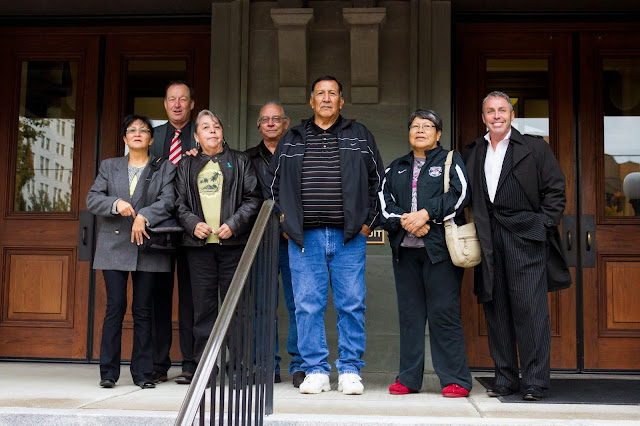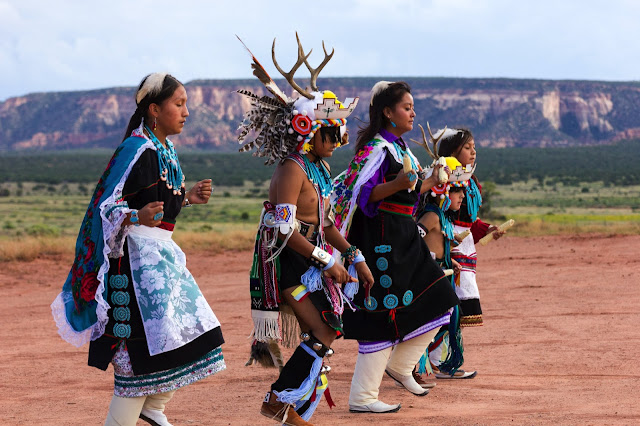Justice Department Declares Indian Vote Denial “Completely Incorrect”
This article appeared in Indian Country Today in 2013. For more on topics like this, see my book, American Apartheid: The Native American Struggle....
“The district judge held that as long as Indians get to vote at all, what’s the problem,” said attorney Steven Sandven, of Sioux Falls, counsel for the plaintiffs, along with David Bradley Olsen, of Henson Efron, in Minneapolis. “The law needs to be clarified.”
The Department of Justice agreed, submitting a statement of interest and an amicus brief and even joining the appeal’s oral arguments—a rare and significant event, said plaintiffs’ attorney David Bradley Olsen, of Henson & Efron, in Minneapolis.
Commanding and concise, DOJ attorney Flynn made her point and drove it home. The district court erred in requiring lead plaintiff Mark Wandering Medicine, who is Northern Cheyenne, along with 15 other Montana Natives to show they had no opportunity whatsoever to elect representatives of their choice: “The plain text of the Voting Rights Act’s Section 2 requires only that the plaintiffs show less opportunity.”
The district judge’s reading of the VRA? “Completely incorrect,” said Flynn. Judge William Fletcher, one of three hearing the case, said he was inclined to agree.
The appeals court’s ruling will directly affect tribes in Ninth Circuit states—Alaska, Arizona, California, Hawaii, Idaho, Montana, Nevada, Oregon and Washington, said OJ Semans, the Rosebud Sioux co-director of Four Directions, which helped Montana tribes request the offices and organize and pay for the lawsuit. “It could also open the door for any minority with circumstances similar to those in Montana. This is a defining moment for Indian country and all minorities.”
“When Erin Flynn introduced herself, I was thrilled,” said Blackfeet tribal member Tom Rodgers, a Native rights strategist and fundraiser who was the whistleblower in the Jack Abramoff scandal. “The United States is on our side.”
It hasn’t always felt that way. The plaintiffs come from three remote, impoverished Montana reservations—Northern Cheyenne, Crow and Fort Belknap—where prospective voters face round trips as long as 180 miles across rugged terrain to the bordertowns where they must register. Many struggle to find a vehicle and gas money for the journey. To eliminate these barriers, each tribe requested one satellite office.
Political participation will help Native people improve their lives, said Wandering Medicine, a Northern Cheyenne ceremonial leader and Vietnam veteran. “Why are the state and counties stopping us?” he asked. “All we want is equality. Everyone says we Indians have to get in step—better ourselves, move forward. Voting will let us do that.”
The lower court ruling emphasized the difficulties the counties claimed they’d face in opening satellite offices. “As practical matter, what would you have to do if you lost?” Judge Barry Silverman asked the county-defendants’ attorney, Sara Frankenstein, of Gunderson Palmer, in Rapid City. As Frankenstein explained the burdens of setting up a scanner and other equipment, Silverman interjected repeatedly, “Why is that a big deal?”
He asked how many new election workers would be needed. “Three,” Frankenstein replied, one for each reservation—but they’d have to be certified. “Do they have to go to France for the training?” quipped Silverman, while Judge Consuelo Callahan noted that a year remained before the 2014 election in which to accomplish these things.
At another point, Frankenstein termed “academic” the appeals panel’s scrutiny of the lower court’s interpretation of the Voting Rights Act. This earned her a rebuke from Judge Callahan, who said, “When judges ask questions, it’s not helpful to deflect them.” At press time, Frankenstein had not responded to a request for comments on the hearing.
The lawsuit’s lead defendant is Montana secretary of state and top elections official Linda McCulloch, who contends she can’t order the offices opened so shouldn’t be part of the suit. Her chief legal counsel, Jorge Quintana, represented her.
Semans speculated that the appeals judges would send the case back to the lower court for a do-over. Four Directions consultant Bret Healy hoped the panel would simultaneously clarify the VRA: “It would save judicial time and effort.”
The hearing drew distinguished onlookers to Portland’s landmarked Pioneer Courthouse. The audience seated in the second-floor courtroom, with its gleaming woodwork and graceful architectural details, included Wandering Medicine and his wife, Ilo; McCulloch; and the general counsel for the National Congress of American Indians, which submitted an amicus brief on the plaintiffs’ behalf. Joining them were Hawk, Rodgers, Healy and Barb and OJ Semans. Also in Portland were councilmen James Diaz and Kenneth McDarment of Tule River Indian Tribe, one of several tribes that supported the lawsuit financially.
Afterward, sitting quietly in the pale autumn sunshine, Wandering Medicine was pleased. Before the hearing, in another part of town, he had presided over a blessing for the day. “It went well for us,” he said.
Wandering Medicine continued, “Securing our voting rights will also be good for us.” And it will be good for America, he said. “Survival depends on sharing.”
Update: In November 2013, the Ninth Circuit vacated the lower court decision and sent the case back to Montana for a new hearing before a new judge.
Text c. Stephanie Woodard; photographs c. Joseph Zummo. This article was reported with support from the George Polk Center for Investigative Reporting.
“May it please the court, Erin Flynn on behalf of the United States.” So began the Justice Department’s presentation in a landmark Native voting-rights lawsuit. The Ninth Circuit Court of Appeals, sitting in Portland, Oregon, heard oral arguments in the suit, Wandering Medicine v. McCulloch, in early October.
The appeals court’s decision, upcoming in the next few months, will turn on whether a Montana district judge misread Section 2 of the Voting Rights Act when he denied requests for satellite registration and early-voting offices on isolated Montana reservations. The local magistrate reasoned that Indians have been elected to office in the state, so Indian voters’ lack of equal rights—which he readily acknowledged—was immaterial.
The appeals court’s decision, upcoming in the next few months, will turn on whether a Montana district judge misread Section 2 of the Voting Rights Act when he denied requests for satellite registration and early-voting offices on isolated Montana reservations. The local magistrate reasoned that Indians have been elected to office in the state, so Indian voters’ lack of equal rights—which he readily acknowledged—was immaterial.
 |
| Attorney Flynn |
The district judge’s reading of the VRA? “Completely incorrect,” said Flynn. Judge William Fletcher, one of three hearing the case, said he was inclined to agree.
 |
| Fr l, Hawk and Barb and OJ Semans |
Michaelynn Hawk, Crow director of the grassroots group Indian People’s Action, called the lawsuit part of the sweep of history. “Indigenous people have been oppressed for so long, but we are stepping forward all over the globe. We will win. It’s inevitable.”
 |
| Fr l, Judges Fletcher, Silverman and Callahan |
 |
| Attorney Frankenstein |
At another point, Frankenstein termed “academic” the appeals panel’s scrutiny of the lower court’s interpretation of the Voting Rights Act. This earned her a rebuke from Judge Callahan, who said, “When judges ask questions, it’s not helpful to deflect them.” At press time, Frankenstein had not responded to a request for comments on the hearing.
Semans speculated that the appeals judges would send the case back to the lower court for a do-over. Four Directions consultant Bret Healy hoped the panel would simultaneously clarify the VRA: “It would save judicial time and effort.”
The hearing drew distinguished onlookers to Portland’s landmarked Pioneer Courthouse. The audience seated in the second-floor courtroom, with its gleaming woodwork and graceful architectural details, included Wandering Medicine and his wife, Ilo; McCulloch; and the general counsel for the National Congress of American Indians, which submitted an amicus brief on the plaintiffs’ behalf. Joining them were Hawk, Rodgers, Healy and Barb and OJ Semans. Also in Portland were councilmen James Diaz and Kenneth McDarment of Tule River Indian Tribe, one of several tribes that supported the lawsuit financially.
 |
| Fr l, Wandering Medicine, Olsen and Sandven |
He compared the lawsuit’s progress to his people’s flight from captivity in Nebraska during the winter of 1878–79, facing bitter cold, starvation and death to return home to Montana. “Back then, thanks to the wishes of a greater force, our ancestors succeeded against great odds to preserve our way of life.”
Update: In November 2013, the Ninth Circuit vacated the lower court decision and sent the case back to Montana for a new hearing before a new judge.



